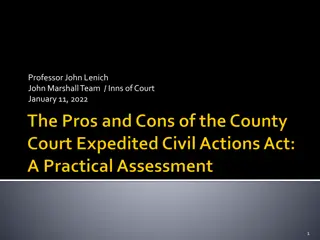Fayette County Mental Health Court Program
Judge John Tackett presides over the Fayette County Mental Health Court, a program dedicated to supporting participants with co-occurring diagnoses. The team, including Program Director Kelly Gunning and Clinical Consultant Connie Milligan, focuses on whole-person wellness and reducing stigma. The program's success is evident through high sobriety rates, housing stability, employment outcomes, and significant savings in diverted incarceration days.
Download Presentation

Please find below an Image/Link to download the presentation.
The content on the website is provided AS IS for your information and personal use only. It may not be sold, licensed, or shared on other websites without obtaining consent from the author.If you encounter any issues during the download, it is possible that the publisher has removed the file from their server.
You are allowed to download the files provided on this website for personal or commercial use, subject to the condition that they are used lawfully. All files are the property of their respective owners.
The content on the website is provided AS IS for your information and personal use only. It may not be sold, licensed, or shared on other websites without obtaining consent from the author.
E N D
Presentation Transcript
Judge John Tackett - Presiding Judge Kelly Gunning Program Director Connie Milligan Clinical Consultant Heather Matics Assistant Commonwealth Attorney Public Defender's Office as assigned Jennifer Van Ort-Hazzard - Coordinator Randy Stafford Addiction Services Coordinator Corey Hall - Peer Support Specialist Makia Adkins - Peer Support Specialist Jennifer Giles - Family/Peer Support Specialist Fayette Mental Health Court Team
Sobriety reflects 100% abstinence. Despite 83% of them facing co-occuring diagnoses, FMHC participants experience minimal relapse when compared to a 10% national statistics rate.
Whole Person Wellness Whole Person Wellness
At Entry At 12 Months 33% of participants are experiencing homelessness 96% of participants are housed Housing Criminal Justice Interface 83% of participants have experienced previous arrests 74% have been arrest free since entry 75% of participants are unemployed 71% of graduates are employed at graduation Employment Outcomes
July 1, 2018- December 31, 2020 $455,000 Investment Return on Investment FCDC Savings 43,275 days of incarceration diverted X $72 / day = $3,115,800
July 1, 2018- December 31, 2020 $455,000 Investment Return on Investment FCDC Savings Nationwide, persons with Serious Mental Illness who are incarcerated locally require an average of 60% more resources than other individuals. 43,275 days of incarceration diverted X $115.20 / day =$4,985,280 (days of incarceration diverted for any non-graduation closed cases not counted)
July 1, 2018- December 31, 2020 $455,000 Investment Return on Investment Each program graduate saves Law Enforcement $22,865 / year or $5,716 / quarter 263 post-graduate quarters X $5,716 / quarter Total cost savings: $1,503,308 $1,503,308/$455,000 = 330.4% (post graduate quarters involving recidivism not counted)
July 1, 2018- December 31, 2020 $455,000 Investment Return on Investment FCDC and Lexington Police Department $6,488,588 / $455,000 =1,426%























